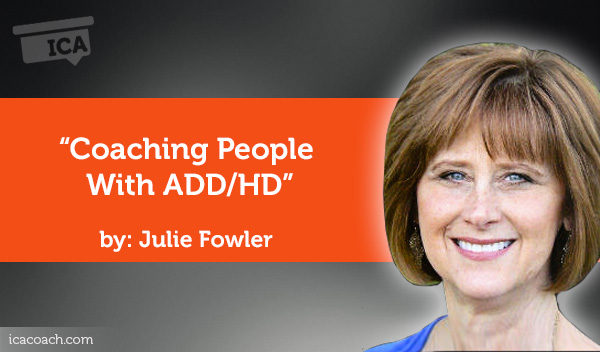
Research Paper By Julie Fowler
(AdHd Coach, UNITED STATES)
Introduction
The need for coaching in this area is vast. It is estimated that ADD/HD impacts somewhere between 5% and 9% of children and teenagers, and about 4% of adults, according to recent studies in the U.S. World-wide studies estimate the prevalence of ADHD at about 5%. http:www.//newideas.net/what-is-adhd/prevalence-of-adhd In the US alone 4% equates to an estimated 8 million adults who have ADD/HD. These are people who view the world differently and who have alternative learning styles. While typically having above average intelligence, they are often left to feel devalued, unappreciated and misunderstood. Coaching is a positive approach in building self-worth and empowerment to these individuals by honoring them to be the expert in navigating through the unique process of individualized self-discovery. The coach creates a safe and trusting environment for the client to experience awareness and positive forward movement in many aspects of their lives.
About Coaching
In order to understand what ADD/HD really is, and how it impacts the lives of those with it, one will first need to clearly understand executive functions of the brain. What are executive function challenges? This paper will look at all that and more. The coaching process and value and significance for coaching in this niche will also be discussed.
Definition of ADD/HD or attention deficit hyperactivity disorder:
A syndrome, usually diagnosed in childhood, characterized by a persistent pattern of impulsiveness, a short attention span, and often, but not always hyperactivity, interfering especially with academics, occupational, and social performance. American heritage dictionary.
The physiology of the ADD/HD brain and executive functions
It is essential for the coach to have a clear understanding of what functions or abilities the ADD/HD brain does differently than a non-ADD/HD brain. Knowing what executive functions are, is paramount to this subject matter.
What are executive functions?
Definition of Executive functions
Executive functions are the cognitive abilities that control and regulate most of what we do in day-to-day life. Executive functions include the ability to initiate, plan and organize, set goals, solve problems, regulate emotions, and monitor behavior. Because these skills play a role in almost all aspects of life, Executive Function deficits can hamper a child academically, socially and emotionally. While they are present from an early age, problems with Executive Functions often do not become apparent until middle school, when the demands for working independently increase. smartkidwithld.org
Explanation of Executive Functions
The ADD brain is greatly challenged with executive functions. What others may take for granted, someone with these challenges may find navigating through an ordinary day extremely frustrating. The brain may not process appropriately, skills such as:
1. Activation
A) Organization
Because the ADD brain is often spinning and unable to slow down racing thoughts, organization is extremely challenging. It’s not uncommon for the ADDer to be very disorganized both at home and work. The cluttered desk and constantly losing things is very common.
B) Prioritizing
Prioritizing is another function that is difficult. This takes effort to slow the racing disorganized thoughts in order to prioritize. Often, they simply don’t know what action to take first.
2. Focus
A) Sustaining Attention
Because the frontal cortex of the ADD/HD brain is not properly engaged, one’s attention is not focused. Therefore, learning is difficult.
B) Difficultly Shifting to Another Task
Often the ADD/HD brain works hard at focusing (over focused) and is completely submerged in the task at hand. This takes much effort and intense concentration. When asked to change tasks, the brain may have a difficult time shifting. This can also cause much frustration for the individual who is intently applying themselves.
3. Effort
It takes much more mental energy/effort to do many of these functions for The ADD/HD brain. It works much harder to function and process than the non-ADD/HD brain.
4. Memory
Retrieving information can be difficult. May walk out of the room and forget the conversation they just had or forgetting what they came into the room for in the first place.
5. Emotion
Often emotions are very intense, the ADD/HD’er can be moody, irritable, and sluggish. This can cause short temperedness. Children can have unexpected outbursts and tantrums. On the other hand, often ADD/HDers are extroverts with fun upbeat personalities.
6. Action
Often the same undesirable behavior is repeated and acted out over and over.
7. Self-regulation
The inability to govern ones own behavior without outside help.
(notes taken from an ADD/HD teleseminar)
The ADD brain is greatly challenged with executive functions. What others may take for granted, someone with these challenges may find navigating through an ordinary day extremely frustrating. The brain may not process appropriately, skills such as:
Why is it important to understand executive functions for coaching?
In order for coaching to be of real value and true service for the client, the coach must first clearly understand that the individuals who have executive function challenges, are most certainly out-of-the box thinkers. The coaching process may look much differently with an ADD/HD person, than with non-ADD/HD individual.
Bringing that awareness into the coaching relationship, along with creative tools and specific education for coaching ADD/HD is a must. The coach will also need to be open minded and bring in fresh perspectives when working with these clients. It’s essential for the success of the client to know that the coach has an in-depth understanding and knowledge of the issues that are common in this segment of the population.
Coaching people with executive function challenges.
First the coach will need to clearly assess the commitment level of the client. This information can be obtained through either a conversation or a specific questionnaire process online. Once that information has been given, it’s vital for the coach to know if the ADD/HD has been diagnosed? Are they using medication to manage it?